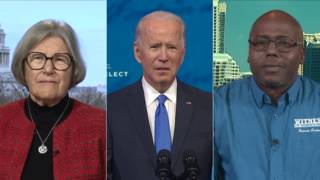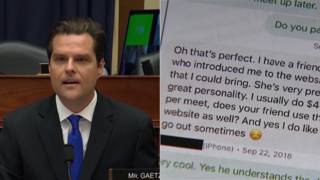
Related
The healthcare debate on Capitol Hill is expected to intensify today with the unveiling of House Speaker Nancy Pelosi’s healthcare bill. The measure reportedly includes a government insurance option and an expansion of Medicaid but drops a proposal to include a public option that would establish reimbursement rates to providers based on Medicare rates. Meanwhile, in the Senate questions remain over whether Senate Majority Leader Harry Reid has enough votes to pass the Senate version of the healthcare reform bill. [includes rush transcript]
Transcript
JUAN GONZALEZ: The healthcare debate on Capitol Hill is expected to intensify this morning with the unveiling of House Speaker Nancy Pelosi’s healthcare bill. The Washington Post reports the bill will include a government insurance option and an expansion of Medicaid.
But Pelosi has reportedly abandoned efforts to include a public option that would establish reimbursement rates to providers based on Medicare rates. Under Pelosi’s bill, rates would be negotiated between providers and federal health officials, similar to the way in which private insurance operates.
Pelosi’s bill will also reportedly include a surtax on high-income people. The new bill, like an earlier version, retains a surtax on wealthy Americans, but Pelosi has significantly reduced the number of taxpayers who will have to pay it. The tax would only hit married couples with an adjusted gross income exceeding $1 million a year and individuals over $500,000. Earlier Democratic bills called for new taxes on individuals making $280,000 a year and for couples making over $350,000.
AMY GOODMAN: In the Senate, questions remain over whether Senate Majority Leader Harry Reid has enough votes to pass the Senate version of the healthcare reform bill. On Wednesday, independent Senator Joseph Lieberman appeared on Fox and vowed to vote against the current legislation.
SEN. JOSEPH LIEBERMAN: I’m not going to vote for healthcare reform that either stifles the economic recovery that we need to start creating jobs again or that increases the debt, which is out of sight right now for our country. And to me, the public option threatens both. It’s just unnecessary. There’s great stuff that we’re discussing that can stop the increase in healthcare costs, regulate insurance companies, cover some who are not covered now with insurance now. This is a new entitlement program, and the taxpayers and the premium payers are going to end up paying for it, or else the debt’s going to go higher, and that’s just the wrong thing to do now. So I just felt if I believe that, it was time for me to say it.
AMY GOODMAN: Critics of Senator Lieberman have accused the Connecticut senator of reversing his campaign pledge from 2006.
SEN. JOSEPH LIEBERMAN: What I’m saying to the people of Connecticut, I can do more for you and your families to get something done to make healthcare affordable, to get universal health insurance.
AMY GOODMAN: After the — well, over at the White House, Press Secretary Robert Gibbs was questioned Wednesday about whether the President has enough votes in the Senate.
REPORTER: Back to healthcare, if the public option, even with an opt-out, loses Olympia Snowe and Joseph Lieberman, aren’t you back to square one?
ROBERT GIBBS: No, and I think it’s — I think this is a debate that is and will go on for quite some time. I think we’ve got a decent ways to go just in this round of it, and I think we’ll see progress — continue to see progress being made. And so, I hate to look two weeks down the road based on what somebody may or may not say today.
REPORTER: How is it changed if you still have Democrats insisting on a public option, Republicans refusing to have it, and still not enough votes to pass it in the Senate?
ROBERT GIBBS: How has it changed? We’re in a process where the House will soon introduce its own bill, because we’re through the committee process; the same on the Senate side. And what’s changed is we’ve never gotten to this point before in debating healthcare reform.
AMY GOODMAN: To talk more about the debate in Washington, we’re joined by Ryan Grim, senior congressional correspondent for the Huffington Post.
Ryan, let’s start with the independent senator from, well, the insurance state of Connecticut, Senator Lieberman. Can you talk about his opposition. Is this a surprise? The significance of this?
RYAN GRIM: When I talked to Democratic leaders immediately after he said this, they said this is nothing new. You know, this doesn’t surprise us. He’s been opposed to the public option from the beginning. And Joe Lieberman has a habit of just when he’s, you know, the least paid attention to, he jumps out, and he says something that gets all the reporters around him. And that usually lasts for a couple weeks. Joe Lieberman is the kind of guy that you can kind of horse trade with.
But what you really need to remember here is that there are two key votes that are going to take place in the Senate, at least two key votes. The first is whether or not you will vote with Harry Reid to allow the bill to get onto the Senate floor. The second key vote is whether you’ll vote with Democrats to allow it to have a final up or down vote. Now, both of those have to make a sixty-vote threshold to overcome a filibuster.
What a lot of people missed is that Lieberman on Wednesday — or on Tuesday said that he would be with Harry Reid on the first vote. So he’s one of the sixty. No Democrat has yet said that they’ll oppose Reid’s motion to proceed to the vote on the Senate floor. So once you get onto the Senate floor, that changes the dynamic, and that really, you know, ups the pressure on Lieberman to get in line at the end of it, because that means that you would have had all of these amendments, weeks of debate, you’re proceeding to a final vote on the bill, and Joe Lieberman is going to stand with the Republicans to give them forty-one votes to oppose a final vote on, you know, the most significant Democratic domestic priority in generations? People think that that’s not going to happen. So it’s crucial that he said he will vote with Reid to get it onto the floor.
JUAN GONZALEZ: And Ryan Grim, you’ve also mentioned in some of your writings the other tactics, the parliamentary tactics, that might be available to Senate Majority Leader Harry Reid, such as a budget reconciliation. Could you talk about that?
RYAN GRIM: Sure. It’s a kind of arcane process, but what it does is it — it is not filibusterable. So, it only needs a simple majority in order to pass, plus Vice President Joe Biden breaking the tie. That means, instead of sixty of your Democratic Caucus, you only need fifty of them. In other words, “Joe Lieberman, thanks, but no thanks. You know, your help is not needed here.” And I put that to him on Wednesday, and he said, you know, “I hope Harry Reid doesn’t do that, but it’s not — the threat of it is not going to change my vote.”
Now, the problem with it is that you can only do things through budget reconciliation that have a direct and substantial impact on the federal deficit. So Democratic leaders have been crafting a bill over the last several months that they think would be able to meet reconciliation guidelines, but it would be up to the Senate Parliamentarian to rule individually on pieces of the bill. You know, he could say this part here does not have a direct part — a direct impact on the budget, and therefore it’s ruled out. And so, you know, people like Kent Conrad and other budget wonks say, you’re going to wind up with Swiss cheese. However, there are a lot of smart people that have been working on this for a long time who think that they actually can craft a piece of legislation that would be able to get through budget reconciliation and only need fifty, fifty-one votes. And just the fact that they’re still pushing that puts pressure on Lieberman to get in line.
AMY GOODMAN: Ryan Grim, what is the House Speaker, Nancy Pelosi, going to lay out today?
RYAN GRIM: She’s going to go with a public option that, as you said, has to negotiate its rates with providers. This is something that’s been in the works for the last couple days. On Tuesday, the Whip, Jim Clyburn, met with progressives and kind of broke the news to them. It was a tense meeting, but Clyburn told them, “Look, you don’t have the votes. Here is the whip count. You know, there aren’t enough Democrats.” Now tensions have flared, because that whip count has leaked. And, you know, members of Congress have said they haven’t seen anything like that in years, where the internal whip document has gotten out. Every reporter on the Hill seems to have it by now. Pelosi had initially tried to get 218 votes by Friday for this Medicare-plus-five. She didn’t get it, so she extended it until Monday, and it just looked like she couldn’t get it.
Now, what’s fascinating about this is that Blue Dogs, the conservative Democrats, are the ones that refused to go along with it, but tying rates to Medicare saves $85 billion over ten years. And you think, well, wait. Blue Dogs are supposed to be about fiscal conservatism, so why wouldn’t they be for something that saves $85 billion? And the answer is that fiscal conservatism is not their priority. Their priority is representing business interests. That 85 billion extra dollars that taxpayers are going to have to spend with negotiated rates is money that gets spent. It gets sent to hospitals, you know, to different care providers. And it makes the public option less competitive with the insurance industry. So it actually makes perfect sense. There’s no irony that the Blue Dogs are the ones that blocked this. So, without their support, there didn’t seem to be the 218 votes, so Pelosi is going with the negotiated rate option and putting some of it on the backs of states by increasing — by expanding Medicaid.
JUAN GONZALEZ: And how do you sense this would have an impact on the Progressive Caucus that has continued to maintain that a public option must be part of the plan. Obviously, Representative Kucinich of Ohio has spoken very strongly that this is a moment of truth for the Democratic Party. Do you expect that some of these — of the progressives would break with the Speaker on this issue?
RYAN GRIM: It doesn’t look like it. So far, they’re mostly holding their fire. Representative Raul Grijalva, who was the leader, essentially, of this whip effort to get up to the 218, put out a statement last night saying, “I’m not rolling over. I’m going to push for an amendment on the House floor that puts all Democrats on record.” So once they’re pushing for an amendment for, you know, the Medicare-plus-five, the robust public option, that means that they want to vote, they want a chance to be heard. Once they’ve been given that chance to be heard and, let’s say, it fails, then you could see them step in line. You know, so the posture that they’re taking is one of, you know, “We just want to be heard,” rather than, “We’re going to lay down in front of the bus on this.”
AMY GOODMAN: Ryan Grim, we want to thank you for being with us, senior congressional correspondent for the Huffington Post.
This is Democracy Now!, democracynow.org, The War and Peace Report. When we come back, a roundtable around what’s been introduced in the House and the Senate, what has been gotten, what has been lost. Stay with us.












Media Options